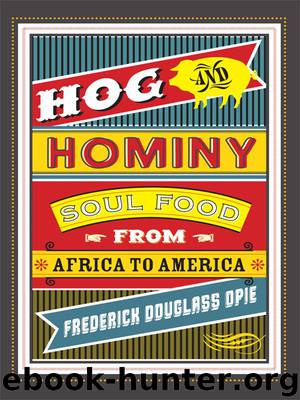Frederick Douglass Opie by Hog & Hominy: Soul Food From Africa to America

Author:Hog & Hominy: Soul Food From Africa to America
Language: eng
Format: mobi, epub
Tags: Social Science, Black Studies (Global), Cooking, African American Studies, Cooking/History, Regional & Ethnic, United States, American, Southern States, Agriculture & Food, African, Ethnic Studies, General, Soul Food, History
ISBN: 9780231517973
Publisher: Columbia University Press
Published: 2008-10-01T05:00:00+00:00
WESTCHESTER COUNTY
Interviews with Westchester County residents make it clear that jim crow customs prevailed in most parts of metropolitan New York.58 Some white-owned restaurants in Westchester flatly refused service to African American customers, while others provided such hostile service that “word got around” not to go into specific bars and grills, says Alice N. Conqueran. Conqueran’s parents migrated to North Tarrytown from the French Caribbean Island of St. Lucia before the Depression. Alice was born in North Tarrytown in 1926 and spent her early childhood years living in the same cold-water flat as my father and his family.59
She remembers that when you walked into some restaurants in the county, “you got the message” that you were not welcome. Scharff’s Restaurant in White Plains was like that in the 1940s and 1950s, for instance; it just didn’t serve African Americans. In the South, jim crow racial hostility in restaurants was “open, but in the North it was subtle, but it was here,” says Conqueran. “You knew where you stood in the South, but in the North, you weren’t sure.” The very popular Wonderful Bar in Tarry-town was another example. This white-owned bar and grill served American cuisine. “I can remember when blacks were not served in the Wonderful Bar,” says Conqueran, “this is going back to the 1940s and 1950s.”60
As Conqueran says, “You have to remember, in those days we weren’t as welcome in restaurants.”61 As a result, many African Americans patronized businesses such as black-owned and -operated bars and grills. Born in 1935, Margaret Opie argues, “because of segregation, black people would go, [I] am talking about young people like us, you would go to these bars not so much for drinking, but to get good food.” Most of the African American bars and grills in the county also had live music on the weekends.62
In metropolitan White Plains, an area with a sizable African American community, there was Tark’s on Central Avenue in White Plains proper, Farmer’s on Tarrytown Road in Greenburg, and Fields’ Rotisserie, also on Tarrytown Road. All were African American–owned and -operated bars and grills. Fields’ was owned and operated by John Fields and his wife; it remained a family-owned business until it closed for good in the 1980s.63
“The bill of fare,” says New Rochelle native Christopher Boswell, “consisted of ribs. . . cooked on a rotisserie and given the barbecue treatment before you served them, and they also served fried chicken.” Boswell worked as a cook at Fields’ in the 1960s. In 1910 His father had migrated from Trinidad to New Rochelle, where he worked as a bank courier in the old Huguenot Trust Company. His mother was from Chicago but migrated in the 1920s to New Rochelle, where she worked as a housekeeper at the old Bloomingdale’s. Boswell remembers that people used to come to the window at Fields’ when it had a “fry-o-ladder” and watch him cook. He would simultaneously fry thirty or more pieces of chicken while bystanders stood in stark amazement, wondering how he knew which pieces were ready to remove from the oil.
Download
Frederick Douglass Opie by Hog & Hominy: Soul Food From Africa to America.epub
This site does not store any files on its server. We only index and link to content provided by other sites. Please contact the content providers to delete copyright contents if any and email us, we'll remove relevant links or contents immediately.
Aircraft Design of WWII: A Sketchbook by Lockheed Aircraft Corporation(32290)
The Great Music City by Andrea Baker(32019)
Call Me by Your Name by André Aciman(20516)
The Secret History by Donna Tartt(19088)
The Art of Boudoir Photography: How to Create Stunning Photographs of Women by Christa Meola(18626)
Shoot Sexy by Ryan Armbrust(17728)
Plagued by Fire by Paul Hendrickson(17412)
Portrait Mastery in Black & White: Learn the Signature Style of a Legendary Photographer by Tim Kelly(17006)
Adobe Camera Raw For Digital Photographers Only by Rob Sheppard(16976)
Photographically Speaking: A Deeper Look at Creating Stronger Images (Eva Spring's Library) by David duChemin(16687)
Ready Player One by Cline Ernest(14675)
Pimp by Iceberg Slim(14507)
Bombshells: Glamour Girls of a Lifetime by Sullivan Steve(14075)
The Goal (Off-Campus #4) by Elle Kennedy(13673)
Art Nude Photography Explained: How to Photograph and Understand Great Art Nude Images by Simon Walden(13046)
Kathy Andrews Collection by Kathy Andrews(11831)
The Priory of the Orange Tree by Samantha Shannon(9098)
The remains of the day by Kazuo Ishiguro(8999)
Thirteen Reasons Why by Jay Asher(8910)
